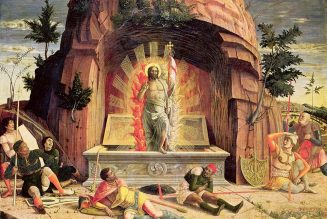
There’s an old saying that goes, “Faults in others I can see, but praise the Lord, there’s none in me.” One is snared in sin by the very act of claiming to have no sin! In fact, it’s the biggest sin of all: pride.
In the Sunday Gospel, the Lord illustrates this through the parable about two men who go to the temple to pray. One man commits the sin of pride and leaves unjustified. The other, though a great sinner, receives the gift of justification through his humility. Let’s look at what the Lord teaches us.
Prideful Premise – Jesus addressed this parable to those who were convinced of their own righteousness. When it comes to parables, it’s easy to gloss over the introductory statement, which often tells us what prompted Jesus to tell the parable. Many people simply see this parable as being about arrogance, but there is more to it than that.
Jesus is addressing the parable to those who are convinced of their own righteousness. They are under the illusion that they are capable of justifying and saving themselves. They think that they can have their own righteousness and that it will be enough to save them.
However, there is no saving righteousness apart from Christ’s righteousness. I do not care how many spiritual pushups you do, how many good works you perform, or how many commandments you keep; it will never be enough for you to earn Heaven. On your own you are not holy enough to enter Heaven or to save yourself. Scripture says, One cannot redeem himself, pay to God a ransom. Too high the price to redeem a life; he would never have enough (Psalm 49:8-9).
Only Christ and His righteousness can ever close the gap, can ever get you to Heaven. Even if we do have good works, they are not our gift to God—they are His gift to us. We cannot boast of them because they are His. Scripture says, For by grace you have been saved through faith, and this is not from you; it is the gift of God; it is not from works, so no one may boast. For we are his handiwork, created in Christ Jesus for the good works that God has prepared in advance, that we should walk in them (Eph 2:8-10).
The Pharisee in this parable has a prideful premise: he is convinced of his own righteousness. Notice that he uses the word “I” four times in his brief prayer.
-
-
-
- I thank you
- I am not like the rest of humanity—greedy, dishonest, adulterous
- I fast
- I pay tithes
-
-
It is also interesting that the Lord indicates that the Pharisee “spoke this prayer to himself.” Some think that this merely means that he did not say the prayer out loud. Others suspect that there is a double meaning, if you will. In effect, the Lord is saying that the Pharisee’s prayer is so self-centered, so devoid of any true appreciation of God, that it is actually spoken only to himself. He is congratulating himself more than he is praying to God, and his “thank you” is purely perfunctory; it is more for his own prideful self-adulation. He is speaking to himself, all right. He is so prideful that even God can’t even hear him!
We see here a prideful premise on the part of the Pharisee, who sees his righteousness as his own, as something that he has achieved. He is badly mistaken.
Problematic Perspective – … and despised everyone else. He looks on others with contempt, perceiving them as beneath him. Notice that the Pharisee is glad to report that he is not like the rest of humanity.
Not only is his remark foolish, it is also impertinent. One will not get to Heaven merely by being a little better than someone else. No indeed, being better than a tax collector, prostitute, drug dealer, or dishonest businessman is not the standard we must meet. The standard we must meet is Jesus. He is the standard. Jesus said, Be perfect, therefore, as your heavenly Father is perfect (Matt 5:48). Now, somebody say, “Lord, have mercy!” It is dangerous (and a waste of time) to compare oneself with others because it misses the point entirely.
The point is that we are to compare ourselves to Jesus and be conformed to Him by the work of His grace. Any honest comparison of ourselves to Jesus should make us fall to our knees and cry out for grace and mercy, because it is the only way we stand a chance.
It is so silly—laughable, really—to compare ourselves to others. What a pointless pursuit! What a fool’s errand! What a waste of time! God is very holy, and we need to leave behind the problematic perspective of looking down on others and trying to be just a little better than some other poor (fellow) sinner.
There’s a lot of talk today about being “basically a nice person,” but being nice isn’t how we get to Heaven. We get to Heaven by being like Jesus. The goal in life isn’t to be nice; the goal is to be made holy. We need to set aside all the tepid and merely humanistic notions of righteousness and come to understand how radical the call to holiness is and how unattainable it is by human effort. Looking to be average, or a little better than others, is a problematic perspective. It has to go; it must be replaced by the Jesus standard.
Let’s put it in terms of something we all can understand: money. Let’s say that you and I are on our way to Heaven; you have $50, while I have $500. Now I might laugh at you and feel superior to you. I might ridicule you and say, “I have ten times as much as you do!” But then we get to Heaven and find out the cost to enter is $70 trillion. Oops. Looks like we’re both going to need a lot of mercy and grace to get in the door. In the end, we are both in the same boat; we’re woefully short. All my boasting was a waste of time and quite silly, to boot. We have a task so enormous and unattainable that we simply have to let God grant it and accomplish it for us.
Prescribed Practice – But the tax collector stood off at a distance and would not even raise his eyes to heaven but beat his breast and prayed, “O God, be merciful to me a sinner.” Given everything we have reflected on, we can only bow our head and cry from the heart, “Lord, have mercy!” Deep humility coupled with lively hope is the only answer.
Being humble isn’t something we can do on our own. We have to ask God for a humble and contrite heart. Without this gift we will never be saved. In our flesh, we are just too proud and egotistical. God needs to give us a new heart, a new mind. Notice that the tax collector in today’s parable did three things; we should do them as well:
Realize your distance – he stood off at a distance. The tax collector realizes that he is a long way from the goal. He knows how holy God is and how distant he himself is. Let’s be clear: the image of a tax collector is shocking. Such men did not get their posts by being “nice guys.” They were often ruthless thugs who didn’t hesitate to use fear and extortion. But his recognition of his distance is already a grace and a mercy. God is already granting the humility by which he stands a chance.
Recognize your disability – he would not even raise his eyes to heaven. Scripture says, No one can see on God and live (Ex 33:20). We are not ready to look on the face of God in all its glory. That is evidenced by the fact that we are still here on earth. Scripture also says, “Blessed are the pure of heart for they shall see God” (Matt 5:8). This tax collector recognizes his disability, his inability to look on the face of God, for his heart is not yet pure enough. In humility, he looks down. His recognition of his disability is already a grace and a mercy. God is already granting him the humility by which he stands a chance.
Request your deliverance – he beat his breast and prayed, “O God, be merciful to me, a sinner.” Notice that the tax collector’s humility is steeped in hope. He cannot save himself, but God can. He cannot have a saving righteousness of his own, but Jesus does. This tax collector summons those twins called grace and mercy. In this man’s humility, a grace given him by God, he stands a chance. For by this humility, he invokes Jesus Christ, who alone can make him righteous and save him. Scripture says, The humble, contrite heart the Lord will not spurn (Ps 51:17). Jesus says, whoever humbles himself will be exalted.
Beware of pride, our worst enemy. Beg for the gift of humility, for only with it do we even stand a chance.
I have it on the best of authority that as he left the temple, the tax collector sang this spiritual: “It’s Me, Oh Lord, Standing in the Need of Prayer.” In the video below it is sung by a German choir, which explains their unusual pronunciation of the word “prayer.” I can’t complain, though; I don’t pronounce Geschwindigkeitsbegrenzung (speed limit) very well either!
[embedded content]
Join Our Telegram Group : Salvation & Prosperity









